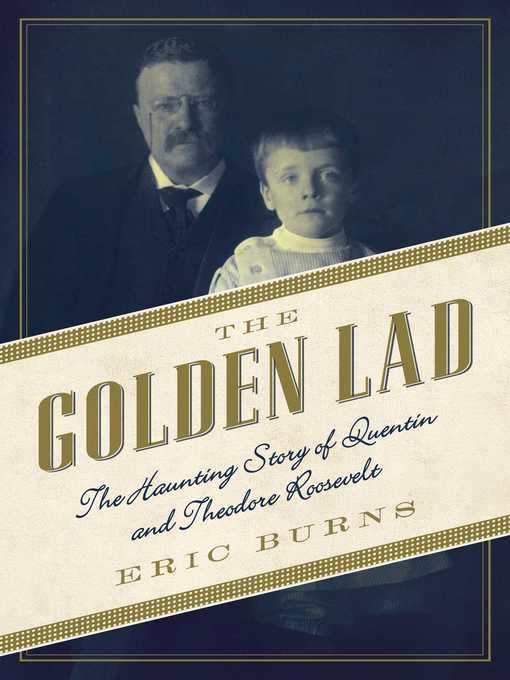
The Golden Lad
کتاب های مرتبط
- اطلاعات
- نقد و بررسی
- دیدگاه کاربران
نقد و بررسی

December 14, 2015
Piercing the larger-than-life Teddy Roosevelt myth, Burns (1920), a former correspondent for NBC News and Today, explores the personal side of the energetic, rambunctious war hero and politician and his doting relationship with his youngest child, Quentin. Burns begins as the Spanish-American war percolates in 1897, with a combative “Teedie” eager to test his valor in battle; Roosevelt described war as “a supreme test of a man’s character.” Roosevelt, a father of six children, chose the fragile Quentin as his favorite. The future leader of the Rough Riders recalled his own tough, illness-prone childhood and how he overcame his ailments through strenuous exercise. War fame propelled Roosevelt from one top government post to another until his selection as William McKinley’s running mate in 1900 (and his ascension to the presidency upon McKinley’s assassination), but he continued to make quality time for his family. Burns crafts his work by balancing Roosevelt’s monumental achievements against his serious character flaws. He also holds Roosevelt responsible for lobbying for the U.S. to enter WWI, a war that claimed the life of his beloved son. Burns’s unique, stirring account of America’s most colorful president allows Teddy Roosevelt, the man and father, to step off the page. Agent: Don Fehr, Trident Media Group.

December 15, 2015
A storied family is broken apart by its patriarch's devotion to war and the quest for honor. As Burns (1920: The Year that Made the Decade Roar, 2015, etc.) recounts, Quentin Roosevelt, born in 1897, was both Theodore Roosevelt's youngest son and the repository of a great deal of his hopes. Sickly like his father, though less inclined to make boastful declarations such as that he was "as strong as a bull moose," Quentin emerged in boyhood as a fine young man with a distinct sense of noblesse oblige. In one sparkling moment in the book, he quietly reproaches a haughty society dame who asks how he can stand the "common boys" at his school: "My father says there are only four kinds of boys: good boys and bad boys and tall boys and short boys; that's all the kinds of boys there are." With less drive than his father, who champed to get into the fight against Spain in Cuba and blustered his way into a "big stick" foreign policy in the White House, Quentin joined the fledgling aviation corps under Eddie Rickenbacker and died in France--an event, Burns writes, for which his mother, Edith, had been preparing ever since her war-loving husband went off to battle and then instilled in his children, one by one, an obligation to go to war. That resolve ended in a spiritual gloom, "a shroud he would wear for the rest of his days." Roosevelt's story is of a piece with his friend Rudyard Kipling's, whose life and work were overturned by the loss of his son in France in 1915. None of it will come as news to readers well versed in the life of Roosevelt--it figures, for instance, in Edmund Morris' Colonel Roosevelt (2010)--but Burns finds special meaning and resonance in the father-son relationship, and his slender book makes for a fine homage. A minor but solid, very well-written contribution to the vast literature surrounding Teddy Roosevelt.
COPYRIGHT(2015) Kirkus Reviews, ALL RIGHTS RESERVED.

January 1, 2016
Quentin Roosevelt (1897-1918), Theodore Roosevelt's youngest and reputedly favorite child, was fatally shot during World War I, just short of his 21st birthday, an event that precipitated his father's death at age 60 less than a year later. That is usually the extent most accounts tell us about this young man whose story historian Burns (1920: The Year That Made the Decade Roar) expands with earlier anecdotes and interpretations. One of four brothers whom sister Ethel called "the Golden Lads," Quentin possessed most of Theodore's good qualities: popularity, daring, enthusiasm, humor, and academic ability. In this crisply written profile, Burns underlines Theodore's contradictions: his love of family life, his favorable view of the masculine proving ground of war, and his tendency to ignore references to the unpleasant, such as public recognition of relatives' deaths. Ironically, Theodore avoided military conflicts as president, instead choosing the negotiating table to the battlefield. As a former president he championed America's entrance into the Great War and all of his sons enlisted. The Roosevelts' enthusiastic letter writing helps Burns highlight Theodore's fatalism and Quentin's obsessive thoughts of death (and incongruous love of heights). A father-son focus reveals much about the multifaceted Theodore's personality. VERDICT Books such as J. Lee Thompson's Never Call Retreat detail Quentin's activities and temperament; however, general readers seeking a naturally sympathetic, full-length portrait will appreciate this work.--Frederick J. Augustyn Jr., Lib. of Congress, Washington, DC
Copyright 2016 Library Journal, LLC Used with permission.

























دیدگاه کاربران